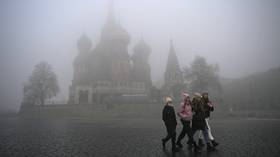Moscow’s unusual ‘radiation fog’ explained

A dense haze engulfing the Russian capital, termed ‘Radiation Fog,’ has meant that more than a hundred flights were unable to take off from the dark gray landscape. However, the country’s scientists say it’s no cause for concern.
On Tuesday, the scientific director of the Hydrometeorological Center, Roman Vilfand, cleared the air around concerns that Moscow’s thick fog could be harmful, in an interview with business daily RBK. According to him, despite its name, the phenomenon has nothing to do with radioactivity.
“With a little cloudy sky at night there is an intense cooling of the underlying surface due to the release of long-wave radiation. Today, in the absence of clouds, the soil, the surface layer of air, cools sharply. In cold air, there is a concentration of water vapor molecules, this is called fog. This is a well-studied physical process,” he explained.
Also on rt.com Russia could sell advanced S-500 anti-aircraft missile launcher to China & India despite potential US ireBefore sunrise on Tuesday, Moscow was blanketed in the thick haze. And as of 9.45am, over 100 flights had been delayed at airports across the city.
Moscow’s Gazeta described the event as like something out of a horror film, after the city’s State Traffic Safety Inspectorate recommended that people travel via public transport and that anyone walking in the streets wear clothing that reflects the light, to avoid accidents in the low-visibility conditions.
Think your friends would be interested? Share this story!













